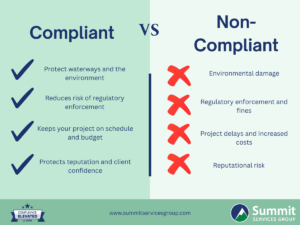The Cost of Stormwater Non-Compliance: Fines, Lawsuits, and Reputation

Pros and cons of compliance.
When construction projects fall out of stormwater compliance, there can be multiple consequences. Stormwater compliance is not just important for the environment and waterways, but also in making sure your project stays on track and isn’t at risk of stop work orders, fines, and damaged reputation. First, we will take a look at what it means to be non-compliant regarding stormwater regulations in the state of Colorado. Then, we will discuss real-life implications of non-compliance and what you may face if your project remains uncompliant.
Falling out of compliance means that a construction site/permitted activity is not meeting the requirements of its Colorado Discharge Permit System (CDPS) stormwater permit and/or local permit. This can happen through missing documentation, improper BMP maintenance, or unauthorized discharges. The Colorado Department of Public Health and Environment (CDPHE) and local MS4 programs (municipal separate storm sewer systems) monitor these conditions through routine and unannounced inspections. Check out “The Top 5 Stormwater Compliance Violations” blog to learn more about avoiding common violations.
When a site falls out of compliance, the CDPHE or local MS4 authority may issue any of the following:
Notices of Violation (NOVs)
An NOV is a formal written notice identifying specific permit violations or deficiencies found during an inspection or file review.
- It serves as the first step in the enforcement process.
- The NOV outlines corrective actions required and provides a deadline (commonly 10–14 days) to address the issues and document compliance.
- Failure to respond adequately or on time can escalate the matter to a Compliance Advisory or Administrative Order.
Cease and Desist Orders (CDOs)
The CDPHE may issue a Cease and Desist Order under the Colorado Water Quality Control Act (C.R.S. § 25-8-601 et seq.) when a discharge violates permit conditions or causes water quality impacts.
- The order requires the permittee to immediately stop the specific unlawful activity or discharge.
- It may also require corrective actions such as stabilizing disturbed areas, installing or maintaining Best Management Practices (BMPs), or revising the Stormwater Management Plan (SWMP).
- Work may resume once the site returns to compliance and CDPHE verifies corrective measures.
Stop Work Orders (SWOs)
Local municipalities, counties, or permitting authorities may issue SWOs if ongoing site activities are causing significant noncompliance or environmental harm. A SWO halts all construction activity on-site until violations are corrected.
These orders are often issued when:
- BMPs have failed or are missing, leading to active sediment discharge;
- There is repeated disregard for prior warnings or inspection findings; or
- Site conditions pose an immediate risk to public infrastructure or nearby waterways.
Work cannot resume until the responsible authority verifies that all corrective measures have been implemented and documentation is provided.
Civil or Administrative Orders / Consent Agreements
If violations persist or are severe, CDPHE may issue an Administrative Order, Civil Order, or negotiate a Consent Agreement with the permittee.
- These are formal, enforceable legal actions under the Colorado Water Quality Control Act and Clean Water Act.
- They typically include mandatory corrective measures, compliance schedules, and may impose civil penalties of up to $10,000 per day, per violation.
- A Consent Agreement (or Consent Decree in court) is a legally binding settlement between CDPHE and the violator that outlines specific terms for returning to compliance and may include monetary penalties or enhanced oversight.
- These actions become part of the public record and can affect a company’s eligibility for future state contracts or permits.
Permit Suspension, Modification, or Revocation
For ongoing or willful violations, CDPHE may suspend or revoke CDPS permit coverage, effectively halting all authorized stormwater discharges.
- Without coverage, any discharge becomes an unpermitted release — a violation in itself.
- Reinstating coverage may require submitting a new permit application, paying additional fees, and demonstrating full compliance.
Reputational and Operational Costs
Besides formal enforcement, there are indirect but real costs: project delays, additional remediation work, increased insurance or bonding requirements, and negative public or community relations.
Also, data about enforcement actions are often made public (e.g. via CDPHE’s enforcement notices and online databases) which can affect business reputation.
Concerned your site may be out of compliance? Our team can help you get back on track and stay there — reach out today.
